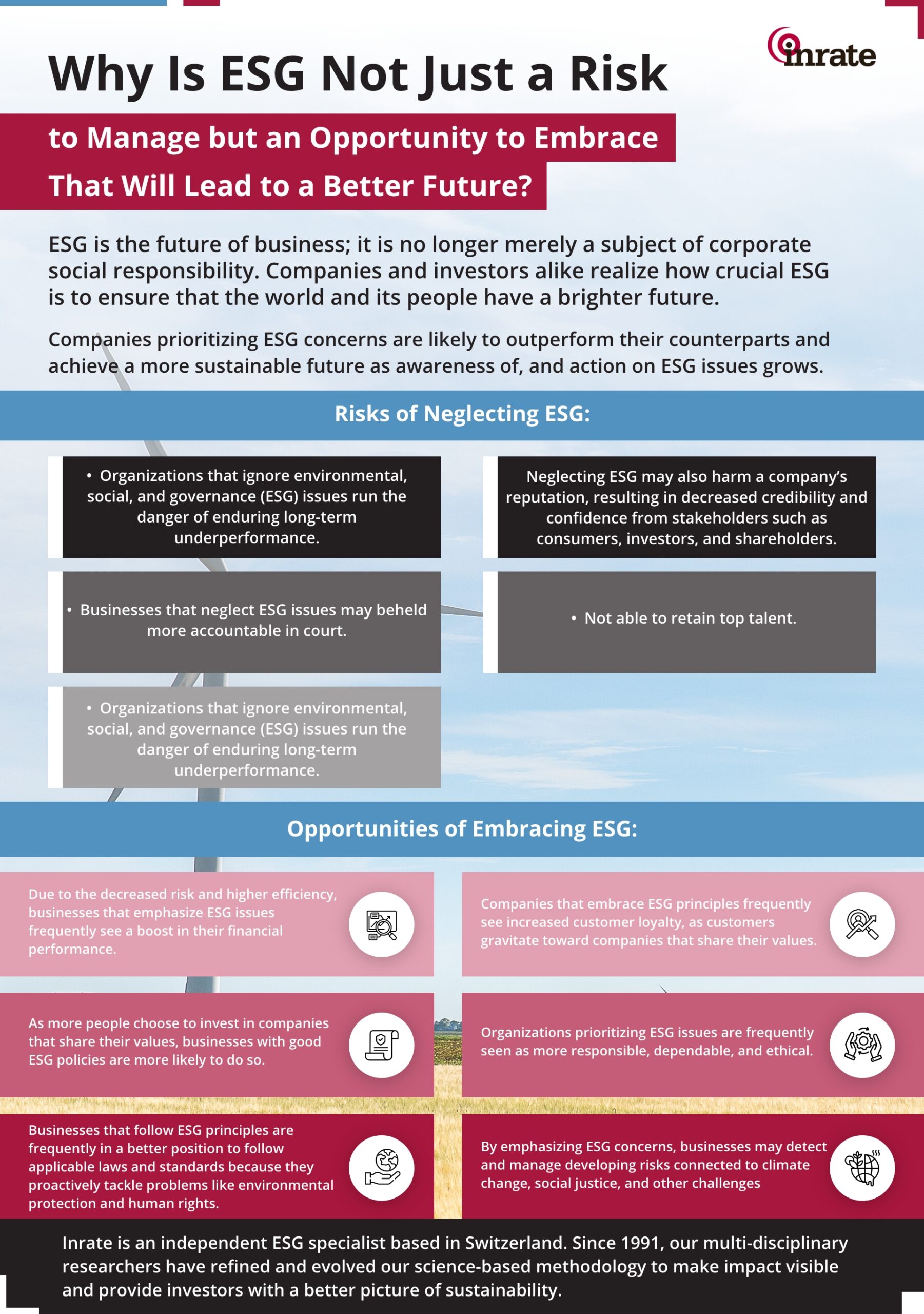ESG (environmental, social, and governance) factors have positioned themselves as pivotal elements within modern company operations and investment strategies. Recognizing the profound implications of ESG on both financial performance and long-term value creation, investors are increasingly integrating ESG considerations into their decision-making processes.
ESG risk management evaluates and minimizes the possible effects of ESG issues on an organization’s productivity, standing, and long-term viability. Ensuring that a firm functions sustainably and responsibly entails recognizing, assessing, and resolving ESG risks and opportunities.
ESG factors are an integral part of investment strategies; it is no longer merely a subject of corporate social responsibility. Investors realize how crucial ESG is to ensure that the world and its people have a brighter future. Investors prioritizing ESG concerns will likely outperform their competitors and achieve a more sustainable future as awareness of and action on ESG issues grows.
Now that we know what ESG Risk Management is and how ESG will be addressed in the future, we will explore why ESG is not just a risk to manage, but an opportunity to embrace that will lead to a better future.
Why is ESG Risk Important?
ESG risks possess the potential to exert significant influence over an organization’s enduring viability, standing, and financial performance, making them a pivotal concern for prospective investors.
- Climate change and resource depletion are two examples of environmental concerns that can increase costs, result in fines, and decrease demand for goods and services.
- Social issues, such as discrimination and breach of labor laws, can damage a company’s reputation, resulting in bad press, lost business, and low staff morale.
- Governance risks, such as fraud and a lack of transparency, can erode investor trust, entail financial fines, and harm a company’s brand.

Due to these factors, businesses must include ESG risks and opporunities management in their entire risk management strategy. Companies may lessen the effect of ESG risks on their operations and improve their long-term resilience by recognizing, assessing, and mitigating these risks. This may be accomplished by creating an ESG risk management policy explaining the organization’s strategy for managing ESG risks, establishing specific ESG targets, and monitoring progress toward these goals.
An effective ESG risk management policy can enable companies to curtail risks and seize opportunities. By giving precedence to ESG considerations, companies can augment their financial performance and bolster their image and brand equity. This approach holds substantial appeal for potential investors seeking returns and alignment with socially responsible and environmentally conscious enterprises.
Understanding the Risks of ESG Neglect
In today’s dynamic investment landscape, Environmental, Social, and Governance (ESG) factors have emerged as pivotal considerations that can greatly impact investment outcomes. Neglecting these factors can lead to a range of risks that investors should be acutely aware of.
- Financial Vulnerability: Companies that fail to address ESG concerns are at risk of facing financial setbacks. Environmental risks like climate change can result in physical damage and regulatory fines, directly affecting a company’s bottom line. Ignoring social issues such as labor disputes or discrimination can lead to reputational damage, which may subsequently reduce market confidence and shareholder value.
- Reputation and Market Value: ESG neglect can tarnish a company’s reputation, causing a decline in market value. Social controversies or governance scandals can trigger public outrage and erode customer loyalty, impacting sales and revenue. Investors can find their portfolios adversely affected as stock prices dip due to negative media coverage.
- Regulatory and Legal Repercussions: Governments worldwide are increasingly enforcing stringent regulations related to ESG practices. Companies that disregard these regulations might face legal penalties, operational disruptions, and increased compliance costs. For investors, this translates to potential losses in the value of their investments due to legal liabilities.
- Long-Term Viability: Businesses that overlook ESG considerations may struggle to adapt to changing market dynamics. As sustainability concerns become more integral to consumer preferences, companies that fail to adopt sustainable practices may lose competitive advantages and long-term growth potential. This can influence investor confidence in the company’s prospects.
- Investor Confidence: Neglecting ESG factors can erode investor trust. In an era where socially responsible investing is gaining prominence, investors increasingly seek to align their portfolios with companies that demonstrate ethical behavior and good governance. Companies with poor ESG performance may find attracting and retaining investor capital harder.
- Missed Opportunities: By disregarding ESG considerations, investors might miss lucrative investment opportunities. Companies that prioritize ESG factors often exhibit strong risk management, innovation, and adaptability, making them more resilient in the face of market volatility.
The Opportunities of Embracing ESG
Embracing Environmental, Social, and Governance (ESG) considerations is not only a responsible approach but also presents a range of compelling opportunities for investors looking to maximize returns while aligning with ethical and sustainable principles.
- Enhanced Long-Term Performance: Companies prioritizing ESG factors often exhibit better long-term financial performance. By effectively identifying and managing ESG risks, these companies are better positioned to navigate challenges, adapt to evolving market dynamics, and seize emerging opportunities, leading to potential gains for investors.
- Risk Mitigation: ESG integration can help mitigate various risks. Companies that manage their environmental impact, adhere to social responsibilities, and maintain strong governance practices are less exposed to reputational and operational risks. This, in turn, can contribute to more stable and predictable investment outcomes.
- Innovation and Market Leadership: ESG-conscious companies are at the forefront of innovation. They frequently develop sustainable products and services that cater to changing consumer preferences and regulatory trends. By investing in such forward-thinking enterprises, investors can tap into potential future market leaders.
- Access to Growing Demand: With the increasing emphasis on sustainability, companies that meet ESG standards are well-positioned to tap into a growing customer base that values ethical and environmentally friendly products and services. Investing in these companies can provide exposure to markets with the potential for significant growth.
- Attracting Millennial Investors: The rise of socially conscious millennials has contributed to a shift in investment priorities. Embracing ESG can attract this demographic, potentially leading to increased demand for shares in companies that align with their values.
- Reduced Volatility: Companies that embrace ESG tend to exhibit lower volatility in their stock prices. Their proactive approach to addressing environmental and social challenges contributes to a more stable long-term performance, which can be particularly appealing to risk-conscious investors.
- Stakeholder Confidence: ESG-conscious companies often enjoy higher levels of stakeholder confidence, including customers, employees, and investors. This can translate into stronger brand equity and better relationships with these stakeholders, contributing to sustained growth and positive investment outcomes.
- Regulatory Compliance: As governments enact stricter environmental and social regulations worldwide, companies that proactively address ESG concerns are better positioned to comply with evolving legal frameworks. Investing in companies with a strong ESG focus can reduce the potential for regulatory disruptions.
- Positive Impact: When investing in companies with high ESG IMPACT ratings, profit and risk mitigation is not at the core of the motivation. However, more focus is put on contributing to positive sustainable development regarding the environment and society. By allocating capital to companies that promote sustainability and ethical practices, investors play a crucial role in driving a positive impact on a global scale.

Implementing ESG in Your Investment Strategy
Incorporating Environmental, Social, and Governance (ESG) considerations into your investment strategy can enhance your portfolio’s resilience, align your investments with your values, and contribute to a sustainable future. Here’s a comprehensive guide to help you seamlessly integrate ESG principles into your investment approach:
Step 1: Education and Awareness
Start by familiarizing yourself with the critical concepts of ESG. Understand how environmental factors (E), social factors (S), and governance factors (G) can impact a company’s long-term performance. Educate yourself about the various ESG metrics, rating agencies, and frameworks available.
Step 2: Define Your ESG Objectives
Clarify your ESG goals and intentions. Determine whether you want to focus on individual ESG themes (e.g., climate change, diversity, ethical governance) or adopt a broader approach. Setting clear objectives will guide your investment decisions and help you evaluate opportunities more effectively.
Step 3: Screen and Identify ESG Investments
Utilize ESG screening techniques to identify companies that align with your chosen ESG criteria. Screening involves evaluating companies based on their products and services, their business practices or their ESG ratings in general. You can use third-party ESG ratings and reports to assist in this process.
Step 4: Analyze ESG Performance
Conduct in-depth research on the shortlisted companies to evaluate their ESG performance. Examine their sustainability reports, corporate policies, and practices. Look for transparency, measurable targets, and a commitment to continuous improvement in ESG areas.
Step 5: Integration into Investment Strategy
Integrate ESG factors into your investment decision-making process. Consider how ESG risks and opportunities align with the company’s financial prospects. Strive for a balanced approach that doesn’t compromise potential returns while considering the broader impact.
Step 6: Engagement and Advocacy
Engage with companies to encourage positive ESG practices. Participate in shareholder meetings, ask questions about their ESG initiatives, and express your concerns. Your voice as an investor can influence companies to enhance their ESG efforts.
Step 7: Monitor and Review
Regularly monitor the ESG performance of the companies in your portfolio. Stay updated on changes in ESG practices and how they impact financial outcomes. Adjust your portfolio as necessary to align with evolving ESG trends and developments.
Step 8: Measure the Impact
Assess the impact of your ESG-focused investments over time. Measure not only financial returns but also the progress companies make in addressing ESG challenges. This evaluation will help refine your strategy and reinforce your commitment to sustainable investing.
Step 9: Seek Professional Guidance
Consult with financial advisors or experts well-versed in ESG investing, like Inrate- an ESG rating agency, if needed. Our insights focusing on overall impact rather than risk can help align your investment choices with your values in addition to achieving your financial objectives.
In Conclusion-
To encapsulate, ESG presents a risk to be mitigated and an avenue to shape a more promising future. The realm of ESG is in a constant state of flux, and those investors who neglect to give precedence to ESG factors could potentially place themselves at a competitive disadvantage over the long haul. Improved financial performance, elevated reputation, and enhanced brand value are potential rewards for investors who embrace ESG principles. By focusing more on ESG Impact rather than risk, ESG investments can support sustainable development and therefore shape a brighter future.
Incorporating ESG principles into your investment strategy might seem like a formidable undertaking, but there exist pragmatic steps that investors can initiate to commence this journey. Investors can capitalize on ESG as a prospect, securing a more sustainable future for both themselves and their stakeholders. This can be achieved by adopting an ESG-oriented approach, conducting comprehensive ESG evaluations, implementing robust ESG risk management protocols, and conducting thorough ESG impact assessments.
Inrate’s ESG Impact Rating is an impartial review of a company’s ESG performance that can assist firms in understanding the impact of their ESG policies on their stakeholders. Companies may assure a better future for themselves and their stakeholders and contribute to a more sustainable global environment by embracing ESG. Therefore, businesses must adopt ESG and turn their approach to risk management into a chance to guarantee a better future.
However, Inrate’s ESG Ratings are based on impact rather than risk. This is crucial when talking about sustainability and the influence a company has on its environment. If you don’t know what that means, feel free to read our article about Risk vs. Impact Ratings. See the difference here: (link).





